Papers by Abdolrasol Divsallar
Middle East Institute , 2022
Will the U.S.
secure a longer and stronger non-proliferation objective by
carrying out a military... more Will the U.S.
secure a longer and stronger non-proliferation objective by
carrying out a military strike on Iranian nuclear facilities?
Will the strike be able to convince the Islamic Republic’s
leadership to abandon sensitive parts of its nuclear
program, if not the whole program? Given the limits of
military strikes, is the threat of war a meaningful strategy
and does it pose a credible threat to Iranian leaders? What
would be the consequences for the U.S.’s future ability to
respond if Iran decides to speed up a new weapons
program after the strike? This paper provides a systematic answer to thise questions.
Trends Research Institute , 2022
Iran Russia's war in Ukraine has brought Russo-Iranian relations to the spotlight. Contrary to th... more Iran Russia's war in Ukraine has brought Russo-Iranian relations to the spotlight. Contrary to the global condemnation of Russia's attack on Ukraine, Tehran has showed strategic sympathy for Russian claims in its war of aggression. In a talk with Putin in Tehran, Supreme Leader Ayatollah Ali Khamenei said that "if Russia Related Content Undersea cables in an age Undersea cables in an age Undersea cables in an age Undersea cables in an age of geop olitical of geop olitical of geop olitical of geop olitical comp etition comp etition comp etition comp etition Conflict in the South Conflict in the South Conflict in the South Conflict in the South Caucasus and its effects Caucasus and its effects Caucasus and its effects Caucasus and its effects on Iran on Iran on Iran on Iran
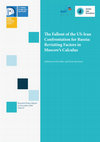
EUI Research Paper, 2020
Amid years of tense relations between the United States and Iran, the shadow of all-out war has n... more Amid years of tense relations between the United States and Iran, the shadow of all-out war has not been a constant feature of relations as it has become in the last two years. The large-scale security implications of US-Iran conflict will change strategic assessment and the core interests of international actors in the Middle East. Among them, Russia, who has become a significant external power in the region, will be largely impacted by a US-Iran conflict. What factors shape Russian calculus of such a conflict? How Russia will respond if United States goes to war with Iran? This report argues that the consequences of such a war on Russia are defined by a combination of benefit to Moscow from heightened tensions, and threats that strike at the core of its interests in the Region. The paper shows that Russian Middle East policy based on the existing balance of power, defined by the lack of a regional hegemon, is likely to become obsolete after a US-Iran war due to significant changes in regional powerhouses. This would be a costly development for Moscow and is likely to frame the Russian rationale in responding. Through an in-depth analysis of both benefits and threats, the report provides a better understanding of factors involved in Russia’s calculus and will help to anticipate a Russian response strategy. The analysis reveals that Russia might benefit more from playing an active de-escalatory role in the region than adopting a passive wait-and-see stance.
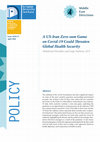
Policy Brief, 2020
The outbreak of the Covid-19 pandemic has had a significant impact on some of the most sensitive ... more The outbreak of the Covid-19 pandemic has had a significant impact on some of the most sensitive questions surrounding international security. One of these is the US-Iran crisis, where the two countries have been on the brink of a full military confrontation since January. To date, both countries continue a zero-sum game, exploiting the pandemic as an opportunity to mount pressure on the adversary. Will the common threat caused by Covid-19 be able to divert Iran and the US from the collision course and push them towards more cooperative behaviour? This policy brief focuses on the cost that current confrontational strategies could have for both sides amid the Covid-19 outbreak, highlighting the threats and the political and strategic limitations that have emerged as a result of the pandemic. It also shows the potential gains at both the regional and the global levels that could arise for both actors if they were to adopt a new approach, based on health diplomacy and cooperation in health security.
EUI Policy Brief, 2020
US-Iran military tension and Europe's uneasy job running the JCPOA dispute resolution mechanism d... more US-Iran military tension and Europe's uneasy job running the JCPOA dispute resolution mechanism displays a complicated path to resolve Iran crisis. How can the E3/EU contain the crisis below a manageable threshold? What could be done if the dispute resolution mechanism fails to produce positive results? E3/EU countries need to adopt an inclusive de-escalatory strategy and combine it with nuclear diplomacy. This strategy should incorporate military and security confidence building measures at its core accompanied by active regional diplomacy and an extension of EU-Iran relations into the developmental and humanitarian dimensions. This paper explores such a de-escalatory strategy and provides clear policy recommendations.
Egmont Royal Institute for International Relations , 2019
Europe's efforts to keep the Joint Comprehensive Plan of Action (JCPOA) for Iran alive hardly see... more Europe's efforts to keep the Joint Comprehensive Plan of Action (JCPOA) for Iran alive hardly seem effective. On 28 June 2019, during a meeting of the Joint Commission of JCPOA, it was announced that the Instrument in Support of Trade Exchanges (INSTEX) has been made operational. 1 Though it injected new hope into saving the deal, it is unlikely that in the long term INSTEX’ limited scope will meet Tehran's demands. The Middle East is going through tough times since the US
unilaterally withdrew from the JCPOA and started to exert 'maximum
pressure' on Iran, prompting unparalleled tensions between the two nations. Can the EU do more?
LobeLog, 2019
Tehran believes that the Trump administration’s “maximum pressure”
campaign could deepen the exis... more Tehran believes that the Trump administration’s “maximum pressure”
campaign could deepen the existing military expenditures disparity between Iran and its rivals and disrupt the regional military balance. It obscures Tehran’s military investments and increases the costs of implementing regional aspects of Iran’s deterrence capabilities. Trump sees “maximum pressure” as a way to restrain Iran’s power projection
capacity to that of a “normal country“. However, Tehran fears that any future military imbalance could ignite a Saudi- or Israeli-led war even if that is not Trump’s intent. This is convincing Iranian leaders to adopt a new military doctrine.
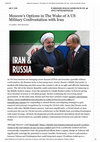
American Herald Tribune , 2019
As US-Iran tensions are changing course beyond JCPOA and towards a possible military confrontatio... more As US-Iran tensions are changing course beyond JCPOA and towards a possible military confrontation, the Russian factor is becoming more crucial. Russia's Middle East policy is marked with balancing acts that secure the country's role as an agile and effective balancing power. The fall of the Islamic Republic could undermine Moscow's capacity for balancing in the Middle Eastern region. It has the potential to cripple Russia's policy in Syria by giving more freedom of action to US-allied groups, further weakening the recovering Assad government. At the same time, Russia and Iran have created a major security convergence for responding to shared threats and adapting strategies to gain required international recognitions by revising the US-led order. Issues that Russia rarely shares with other Middle Eastern powers. And most significantly, a US-led attack on Iran would pave the way for US-led security architecture in the Middle East, providing Washington with major leverage. All these developments provide ground for speculation about the degree of Moscow’s involvement in a possible military confrontation between Iran and the United States.
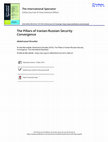
The International Spectator: Italian Journal of International Affairs , 2019
Despite various analyses of the extent of Iranian-Russian rapprochement, questions still remain a... more Despite various analyses of the extent of Iranian-Russian rapprochement, questions still remain about its fundamental elements and its sustainability in the face of the conflicting interests of the two countries. Iran and Russia have pursued security convergence as a joint power maximisation policy, which can be better understood through Iran and Russia’s common feelings of ‘international misrecognition’ and ‘common threat perceptions’. These are the pillars of the nexus between them, explaining how the two countries have a shared understanding of their security environment and particularly how their mutual sense of insecurity has taken the lead in forging bilateral relations. As long as these pillars remain effective, existing limits to bilateral relations rooted in mistrust, disagreements and rivalries will not have significant effects on the convergence.
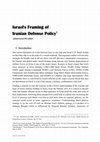
Limes (Italian Review of Geopolitics), 2019
Iran's behavior in Syria is rooted in its threat perception and follow the concept of "balance of... more Iran's behavior in Syria is rooted in its threat perception and follow the concept of "balance of threat". It should be seen as a part of a broader doctrine called "Offensive Deterrence" designed to neutralize Israeli, American or Joint Arabic plans to launch a strike against Iran. This article discusses from the Iranian perspective how prolonged Israel's "Preemptive Counter-offensive Doctrine" has contributed to transforming Iranian defense policy from "Defensive Deterrence Doctrine" to "Offensive Deterrence Doctrine".Off course, the dynamics of other regional threats including rising Saudi threats and the GCC were critical in introducing the new doctrine, but this essay is limited to investigate Israel's footprints in changing Iranian strategic thought. The Offensive Deterrence Doctrine is a forward defense that urges more active regional presence and accelerates the pace of missile program to stop the threat from its source. Hence while the move may consider being costly and unjustifiable from an economic point of view, it is thought to be an effective affordable deterrence strategy from a military point of view.
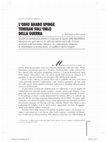
Limes: Italian Review of Geopolitics, 2018
perché l'Iran sia percepito come una minaccia degli Stati arabi del Golfo. Ampie dimensioni, popo... more perché l'Iran sia percepito come una minaccia degli Stati arabi del Golfo. Ampie dimensioni, popolazione giovane e dinamica, sistema politico stabile, potenza bel-lica, «clienti» sciiti, soft power, programma nucleare e capacità di proiezione della forza militare oltreconfine sono solo alcuni aspetti della «minaccia iraniana». E il persistere su tale percezione certo non giova alla stabilità della regione. Meno si dice, tuttavia, sul perché l'Iran vede le politiche dei suoi vicini arabi come potenziali minacce. Comprendere come Teheran percepisce gli Stati arabi del Golfo, specie Arabia Saudita ed Emirati Arabi Uniti, è altrettanto decisivo per la sicurezza mediorientale. La percezione iraniana dei suddetti paesi sta cambiando, e non in meglio: da tradizionali rivali regionali (Arabia Saudita) e partner commerciali (Emirati) a sog-getti ostili, che minacciano seriamente la sicurezza e l'integrità nazionali. La postu-ra del principe ereditario saudita Muõammad bin Salmån (MbS) e le politiche aggressive del suo omologo emiratino Muõammad bin Zåyid (MbZ), che punta espli-citamente a un cambio di regime in Iran, stanno generando una profonda revisione del pensiero strategico di Teheran. Nell'ottica iraniana, Riyad e Abu Dhabi si sono trasformate da semplici rivali in aperti nemici, innescando una serie di aggiusta-menti nella dottrina militare nazionale. Il ruolo chiave delle minacce nel definire la politica estera e di sicurezza ira-niana è stato rimarcato a più riprese dalla Guida suprema, l'ayatollah Ali Khame-nei 1. L'enfasi posta sulla percezione delle minacce come base per l'elaborazione di 1. H. Khazaaei, «La difesa passiva nell'ottica della Guida suprema» (in farsi), Basirat va Tarbiyat Eslami, vol. 36, n. 1 primavera 2015. L'ODIO ARABO SPINGE TEHERAN SULL'ORLO DELLA GUERRA di Abdolrasool Divsallar Sauditi ed emiratini puntano a rovesciare il regime della Repubblica Islamica con ogni mezzo. Le cifre del riarmo nel Golfo. Il ruolo di Israele e del terrorismo islamico. Le contromisure iraniane. Se Washington si fa trascinare, il conflitto è dietro l'angolo.
The Washington Quarterly, 2017
Siasat Defaei (Defence Policy Quarterly), 2007
این مقاله به مقایسه محتوایی و الگوی نگارش اسناد امنیت ملی روسیه می پردازد. در این مقاله آخرین سند... more این مقاله به مقایسه محتوایی و الگوی نگارش اسناد امنیت ملی روسیه می پردازد. در این مقاله آخرین سند امنیت ملی روسیه در سال 2008 مورد تحلیل محتوایی قرار گرفته است.
Rahbord defaei (Defence Strategy Quarterly), 2008
این مقله تلاش می کند با بررسی اسناد امنیتی و سیاست خارجی روسیه، میزان همگرایی این دو با یکدیگر را... more این مقله تلاش می کند با بررسی اسناد امنیتی و سیاست خارجی روسیه، میزان همگرایی این دو با یکدیگر را در سطح هدفگذاری بررسی کند. در حقیقت مقاله نشان می دهد برنامه های مدرنیزاسیون ارتش روسیه چگونه با اهداف سیاست خارجی این کشور مطابقت می یابند تا در نهایت بتوانند به عنوان منبعی برای سیاست خارجی روسیه نقش ایفا کنند.
Talks by Abdolrasol Divsallar
Robert Schuman Center, European University Institute, 2019
How Iranians make strategic thinkings? How Iranian leaders judge their strategic environment and ... more How Iranians make strategic thinkings? How Iranian leaders judge their strategic environment and make their choices? In my speech at the European University Institue, I presented a model called ‘Iran's Cognitive Context of Strategic Thinking’ to explain the issue. threat perceptions, elite interests, changes in national resources, and driving forces (inputs from social-historical-ideological and institutional lessons) - construct the cognitive context of strategic thinking in Iran. The synthetic interaction among these elements and the reasoning based on them shapes the way Iranian decision-makers judge the strategic environment, order their preferences and make foreign or security policy decisions.
Books by Abdolrasol Divsallar
EUI Press Book , 2021
This text may be downloaded only for personal research purposes. Any additional reproduction for ... more This text may be downloaded only for personal research purposes. Any additional reproduction for other purposes, whether in hard copies or electronically, requires the consent of the Robert Schuman Centre for Advanced Studies. If cited or quoted, reference should be made to the full name of the author(s), editor(s), the title, the year and the publisher. Views expressed in this publication reflect the opinion of individual authors and not those of the European University Institute.











Uploads
Papers by Abdolrasol Divsallar
secure a longer and stronger non-proliferation objective by
carrying out a military strike on Iranian nuclear facilities?
Will the strike be able to convince the Islamic Republic’s
leadership to abandon sensitive parts of its nuclear
program, if not the whole program? Given the limits of
military strikes, is the threat of war a meaningful strategy
and does it pose a credible threat to Iranian leaders? What
would be the consequences for the U.S.’s future ability to
respond if Iran decides to speed up a new weapons
program after the strike? This paper provides a systematic answer to thise questions.
unilaterally withdrew from the JCPOA and started to exert 'maximum
pressure' on Iran, prompting unparalleled tensions between the two nations. Can the EU do more?
campaign could deepen the existing military expenditures disparity between Iran and its rivals and disrupt the regional military balance. It obscures Tehran’s military investments and increases the costs of implementing regional aspects of Iran’s deterrence capabilities. Trump sees “maximum pressure” as a way to restrain Iran’s power projection
capacity to that of a “normal country“. However, Tehran fears that any future military imbalance could ignite a Saudi- or Israeli-led war even if that is not Trump’s intent. This is convincing Iranian leaders to adopt a new military doctrine.
Talks by Abdolrasol Divsallar
Books by Abdolrasol Divsallar
secure a longer and stronger non-proliferation objective by
carrying out a military strike on Iranian nuclear facilities?
Will the strike be able to convince the Islamic Republic’s
leadership to abandon sensitive parts of its nuclear
program, if not the whole program? Given the limits of
military strikes, is the threat of war a meaningful strategy
and does it pose a credible threat to Iranian leaders? What
would be the consequences for the U.S.’s future ability to
respond if Iran decides to speed up a new weapons
program after the strike? This paper provides a systematic answer to thise questions.
unilaterally withdrew from the JCPOA and started to exert 'maximum
pressure' on Iran, prompting unparalleled tensions between the two nations. Can the EU do more?
campaign could deepen the existing military expenditures disparity between Iran and its rivals and disrupt the regional military balance. It obscures Tehran’s military investments and increases the costs of implementing regional aspects of Iran’s deterrence capabilities. Trump sees “maximum pressure” as a way to restrain Iran’s power projection
capacity to that of a “normal country“. However, Tehran fears that any future military imbalance could ignite a Saudi- or Israeli-led war even if that is not Trump’s intent. This is convincing Iranian leaders to adopt a new military doctrine.